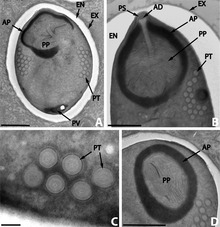|
Nosema (microsporidian)
Nosema is a genus of microsporidian parasites. The genus, circumscribed by Swiss botanist Carl Nägeli in 1857, contains 81 species.[1] Most parasitise insects and other arthropods, and the best-known Nosema species parasitise honeybees, where they are considered a significant disease by beekeepers, often causing a colony to fail to thrive in the spring as they come out of their overwintering period. Eight species parasitize digeneans, a group of parasitic flatworms, and thus are hyperparasites, i.e., parasites of a parasite.[2] Species
Nosema locustae, which parasitises locusts and grasshoppers, and Nosema grylli, which parasitises crickets, have been transferred to Paranosema, or in the former case Antonospora. Nosema algerae, which parasitises anopheline mosquitoes, has been transferred to Brachiola. Nosema kingii, which parasitises fruit flies, and Nosema acridophagus, which parasitises grasshoppers, have been transferred to Tubilinosema. Studies of DNA sequences imply that the boundaries between the genera Nosema and Vairimorpha are incorrectly drawn.[citation needed] References
External linksWikispecies has information related to Nosema. |
||||||||||||||||
Portal di Ensiklopedia Dunia
